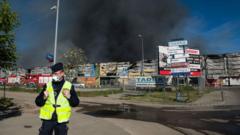Poland's Foreign Minister Radek Sikorski claimed in a recent BBC interview that the Kremlin utilized the Telegram messaging platform to recruit arsonists, leading to the destructive fire at the Marywilska shopping centre in 2024. This incident destroyed approximately 1,400 small businesses, many operated by members of Warsaw’s Vietnamese community. Sikorski described the tactic as "completely unacceptable," especially noting the miraculous absence of injuries.
Following an in-depth national investigation, Polish authorities attributed the fire to Russian intelligence services, prompting immediate diplomatic repercussions. Poland has since closed a second Russian consulate in Krakow to mitigate further espionage threats, signaling a tightening grip on Russian diplomatic presence in the country. Only one consulate remains operational, alongside the main embassy.
Russia has adamantly denied these accusations. Kremlin spokesperson Dmitry Peskov dismissed the claims as "baseless" and accused Poland of fostering a "Russophobic" agenda. He interpreted the closure of consulates and the heightened tensions as a reflection of Poland's increasingly hostile stance towards Russia.
In light of these developments, Poland's Prime Minister Donald Tusk revealed that some individuals implicated in the arson are already in custody, while others remain at large. This investigation marks a continuing trend of intensified scrutiny on Russian activities within Polish borders since the onset of the Ukraine conflict in 2022. Determined not to sever all ties with Moscow, Sikorski emphasized hopes for de-escalation but warned that further hybrid attacks by Russia would prompt additional measures.
As Poland grapples with the aftermath of the shopping centre fire, which resulted in significant financial losses for business owners, the nation appears steadfast in its resolve to confront perceived threats from its eastern neighbor.
Following an in-depth national investigation, Polish authorities attributed the fire to Russian intelligence services, prompting immediate diplomatic repercussions. Poland has since closed a second Russian consulate in Krakow to mitigate further espionage threats, signaling a tightening grip on Russian diplomatic presence in the country. Only one consulate remains operational, alongside the main embassy.
Russia has adamantly denied these accusations. Kremlin spokesperson Dmitry Peskov dismissed the claims as "baseless" and accused Poland of fostering a "Russophobic" agenda. He interpreted the closure of consulates and the heightened tensions as a reflection of Poland's increasingly hostile stance towards Russia.
In light of these developments, Poland's Prime Minister Donald Tusk revealed that some individuals implicated in the arson are already in custody, while others remain at large. This investigation marks a continuing trend of intensified scrutiny on Russian activities within Polish borders since the onset of the Ukraine conflict in 2022. Determined not to sever all ties with Moscow, Sikorski emphasized hopes for de-escalation but warned that further hybrid attacks by Russia would prompt additional measures.
As Poland grapples with the aftermath of the shopping centre fire, which resulted in significant financial losses for business owners, the nation appears steadfast in its resolve to confront perceived threats from its eastern neighbor.















